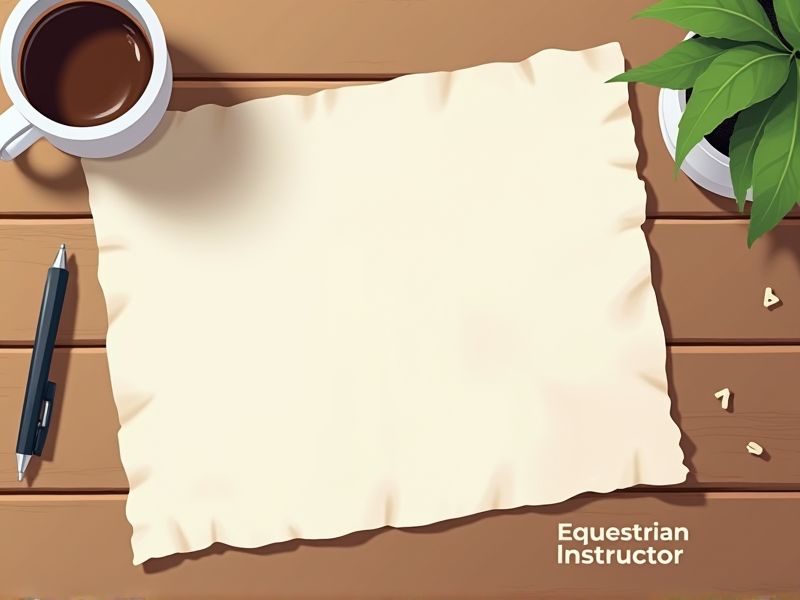
Becoming an equestrian instructor requires a deep understanding of horse behavior, safety regulations, and effective teaching methods. Certifications validate an instructor's expertise, ensuring they possess the necessary skills to handle and train both horses and riders safely. They also enhance credibility and trust among clients, which can lead to more job opportunities and professional growth. Some important certifications you may need for an equestrian instructor include those focused on safety, first aid, and skill-specific training.
British Horse Society (BHS) Level 2 Riding Instructor Certification
The BHS Level 2 Riding Instructor Certification ensures that equestrian instructors have a standardized level of competence, providing consistency and safety in teaching practices. With this certification, instructors gain reputable acknowledgment within the equestrian industry, enhancing their professional credibility and employability. It equips instructors with essential skills to assess and develop riding techniques effectively, crucial for student progression. Moreover, the certification educates instructors on horse welfare, ensuring they impart knowledge that prioritizes the health and well-being of the animals.
Certified Horsemanship Association (CHA) Instructor Certification
CHA Instructor Certification provides a standardized approach to teaching equestrian skills, which ensures consistency and safety across different riding programs. This certification helps instructors develop effective teaching methods that accommodate diverse learning styles of students. The structured curriculum also promotes a comprehensive understanding of horse management and care, reinforcing the overall well-being of both horse and rider. Potential employers often recognize CHA certification as a mark of professionalism, increasing job opportunities for certified instructors.
American Riding Instructors Association (ARIA) Certification
The ARIA Certification provides standardized qualifications that ensure an equestrian instructor possesses the necessary skills and knowledge to teach effectively and safely. When instructors hold ARIA certification, students and parents gain confidence in their abilities, potentially increasing enrollment and trust in their programs. Certified instructors demonstrate a commitment to professional development, which can lead to better teaching methods and improved student outcomes. By adhering to established safety standards, ARIA-certified instructors help reduce the risk of accidents and enhance the overall riding experience.
United States Equestrian Federation (USEF) Certified Instructor Program
The USEF Certified Instructor Program ensures equestrian instructors meet nationally recognized standards, promoting consistent and safe teaching practices. By being certified, instructors gain credibility that reassures students and parents about the quality of instruction. The program's structured approach guides instructors in skill development and staying updated with the latest industry standards. Certified instructors contribute to elevating the overall competency and safety of equestrian sports in the United States.
Equine First Aid & CPR Certification
Equestrian instructors frequently work with horses, which increases their likelihood of encountering medical emergencies requiring immediate attention. Having Equine First Aid & CPR Certification equips them with the necessary skills to address incidents promptly, reducing potential injury severity. This certification enhances their ability to manage sudden health issues in horses, ensuring safety for both animals and riders. Certified instructors are more trusted by clients, as they demonstrate a commitment to maintaining high safety standards in equestrian activities.
Equine Behavior and Welfare Certification
Equestrian instructors benefit from Equine Behavior and Welfare Certification as it equips them with knowledge to manage horse behaviors effectively, ensuring safe and productive training sessions. This certification empowers instructors to recognize signs of stress or discomfort in horses, thereby minimizing risk of injury to both the animal and rider. Mastering welfare principles through certification can enhance an instructor's reputation, attracting more students and client trust. Understanding equine welfare is essential for fostering a compassionate and ethical teaching environment, aligning with contemporary standards in horse training and care.
Child Protection in Equestrian Settings Certification
Children involved in equestrian activities are susceptible to unique risks, necessitating trained instructors who are equipped to mitigate these hazards effectively. Certification in child protection ensures that equestrian instructors understand legal and ethical standards, promoting a safer environment. A standardized certification process helps maintain consistent safety protocols across different settings, reducing incidents of neglect or misconduct. Parents are more likely to trust certified instructors, thereby increasing participation and fostering a positive experience for young riders.
Equine Nutrition Certification
Proper equine nutrition knowledge ensures an equestrian instructor can maintain horse health and optimize performance. Inadequate nutrition often leads to health issues such as colic or laminitis, which can severely impact a horse's ability to train and perform. Certification provides instructors with evidence-based guidelines, reducing risks of malnutrition and associated costs from veterinary care. Educated instructors can better advise horse owners and riders, fostering safer and more effective equestrian practices.
Advanced Equestrian Coaching Certification
The Advanced Equestrian Coaching Certification equips instructors with the latest techniques, ensuring they provide safe and effective training for riders. This certification enhances the credibility of instructors, attracting a clientele that seeks verified expertise and proven track records. Industry trends show that riders trained by certified instructors tend to achieve higher competitive success, reflecting the quality of guidance received. As equestrian sports evolve, ongoing education through certification helps instructors stay current with safety standards and innovative practices.
Equestrian Facility Safety and Management Certification
An Equestrian Facility Safety and Management Certification equips instructors with essential skills to maintain the safety and well-being of both riders and horses. Understanding facility management practices reduces the risk of accidents and enhances operational efficiency. Certification ensures instructors stay current with industry standards and regulations, promoting a professional learning environment. It fosters trust among students and parents, as they perceive a commitment to safety and professionalism.
Summary
When you hire an Equestrian Instructor with certifications, you access a professional with verified skills and knowledge. Their formal training enhances teaching methods, resulting in improved rider performance. Certified instructors often ensure better safety standards, reducing the risk of accidents. Clients typically report higher satisfaction and progress, increasing demand for services.
